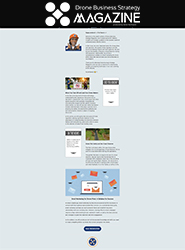
In the dynamic and ever-evolving field of commercial drone operations, the critical importance of sound decision-making cannot be overstated. The skies are our domain, and accidents often arise when pilots allow emotions to guide their actions instead of relying on a foundation of logical reasoning.
This article serves as a comprehensive guide for commercial drone pilots and service providers, offering strategies that prioritize logic over emotion. By doing so, we aim to not only ensure safer skies but also contribute to a positive public perception of drones and their myriad applications.
Understanding Logic and Emotion
In the intricate realm of decision-making, two powerful forces often vie for supremacy: logic and emotion. Understanding the nature of each, their differences, strengths, and weaknesses is essential for commercial drone pilots seeking a balanced approach to flight operations.
Definition of Logic
Logic is the systematic and rational analysis of information, guided by principles that lead to consistent and reliable conclusions. It relies on facts, evidence, and a structured framework to derive objective insights. Logical decision-making involves a step-by-step process, evaluating the pros and cons of a situation to reach the most reasonable and sound conclusion.
Strengths of Logic
- Consistency: Logical decisions maintain a consistent and objective foundation.
- Precision: Logic allows for precise analysis and evaluation of information.
- Problem-Solving: Logical thinking excels in breaking down complex issues into manageable components.
- Objectivity: Logical decisions are less susceptible to personal biases.
Weaknesses of Logic
- Emotional Disconnection: Purely logical decisions may lack an understanding of human emotions and social nuances.
- Incomplete Information: Logic relies on available information, and decisions can be limited by gaps in data.
- Rigidity: In some situations, a strictly logical approach may lead to inflexibility or an inability to adapt to unforeseen circumstances.
Definition of Emotion
Emotion is the subjective, often visceral, response to a situation, influenced by feelings, instincts, and personal experiences. Emotion adds a human touch to decision-making, encompassing a range of feelings from joy and excitement to fear and anxiety. Emotional decision-making is driven by intuition, empathy, and a sense of personal connection to the circumstances.
Strengths of Emotion
- Human Connection: Emotional decisions can foster empathy and understanding.
- Creativity: Emotional responses may lead to creative solutions and innovative thinking.
- Motivation: Emotions can serve as powerful motivators, driving action and commitment.
- Quick Decision-Making: In certain situations, emotions enable rapid responses to immediate threats or opportunities.
Weaknesses of Emotion
- Subjectivity: Emotional decisions are inherently subjective and may vary among individuals.
- Impulsivity: Emotional responses can lead to impulsive actions without careful consideration.
- Bias: Personal biases can heavily influence emotional decision-making.
- Inconsistency: Emotional decisions may vary based on mood and external factors.
Balancing Logic and Emotion
The key to effective decision-making lies in finding a balance between logic and emotion. For commercial drone pilots, combining the precision of logic with the empathy of emotion allows for well-informed, adaptable, and safety-focused decisions. Striking this balance ensures a comprehensive understanding of both the technical aspects and human elements involved in navigating the skies, contributing to a harmonious and effective approach to flight operations.
Section 1: Awareness of Bias and Critical Thinking Skills
Commercial drone pilots find themselves susceptible to biases that may unconsciously influence their decision-making. As an example, consider a pilot who harbors a personal preference for flying in clear, sunny weather. This bias could cloud their judgment, leading them to overlook potential safety risks associated with adverse conditions.
By actively recognizing and mitigating such biases, pilots can cultivate critical thinking skills. This involves questioning information, evaluating evidence, and considering alternative perspectives, ensuring a more balanced and logical approach to decision-making, even in the face of complex situations.
Section 2: Data-Driven Decision Making
In the realm of commercial drone operations, decisions rooted in data and evidence significantly contribute to safety. Imagine a drone pilot planning a critical survey mission. By utilizing advanced weather forecasting tools and real-time data, the pilot can make informed decisions about the optimal time and location for the survey. This data-driven approach not only enhances safety but also contributes to the efficiency and success of the mission.
Accessing reliable information sources and employing technologies like airspace management systems further reinforces the credibility of the decision-making process.
Section 3: Emotion Regulation and Taking a Step Back
Emotions can be powerful, but they can also be misleading. In the midst of unexpected challenges during flight, maintaining emotional composure is paramount. Consider a scenario where a drone pilot encounters technical difficulties. Instead of reacting impulsively or panicking, taking a step back to gain perspective allows the pilot to objectively assess the situation.
This emotional distance facilitates clearer thinking, leading to better-informed and more logical decisions, ultimately ensuring the safety of the drone and those in its vicinity.
Section 4: Decision-Making Frameworks and Consulting Others
Complex flight scenarios often demand structured decision-making frameworks. For instance, adopting tools like SWOT analysis or engaging in risk assessment methodologies enables pilots to break down intricate situations into manageable components. Collaboration is also key to informed decision-making. A drone service provider planning an aerial inspection, for example, might consult with engineers and safety specialists.
This collaborative approach ensures a comprehensive understanding of potential challenges and solutions, adding layers of logic and expertise to the decision-making process.
Section 5: Continuous Learning and Adapting to Change
The drone industry is a dynamic landscape of technological advancements and evolving regulations. A commitment to continuous learning is fundamental. Imagine a scenario where a new regulation is introduced, impacting flight procedures. Regularly updating knowledge on regulations, technology, and best practices ensures that drone pilots can adapt their thinking to new information, fostering a proactive and informed approach to decision-making.
This dedication to ongoing learning not only enhances safety but also positions drone pilots as leaders in an industry that demands adaptability.
Conclusion: The Takeaway
In the fast-paced and ever-changing world of commercial drone operations, the role of logical decision-making cannot be overstressed. By actively applying the principles of awareness, critical thinking, data-driven analysis, emotion regulation, and continuous learning, drone pilots elevate their ability to navigate the skies with heightened responsibility and professionalism. These strategies not only contribute to safer skies but also play a pivotal role in shaping a positive public perspective on the invaluable services drones provide across various industries.
As we collectively strive for excellence, let each logical decision made in the air be a testament to the commitment to the safety and success of the commercial drone industry.
Be smart, safe, and forever fly!
If you have any questions, let us know! If you’d like to hire us, you can get more information here.
Written by: Tony Marino, MBA – FAA Certified Part 107 Commercial Drone Pilot and Chief Business Strategist at Aerial Northwest
Disclaimer: The information provided in this blog post is for general informational purposes only and should not be construed as legal advice.
Resources

DRONE BUSINESS STRATEGY MAGAZINE
A free digital publication made exclusively for all small business drone pilots to them help start-up, become profitable while sustaining a competitive advantage within the drone service industry sector they opt to serve.
“If you love to fly, we’d love to have you come aboard!”
We share your information with no one. Our Privacy Policy.









Leave a Reply
Your email is always safe with us.